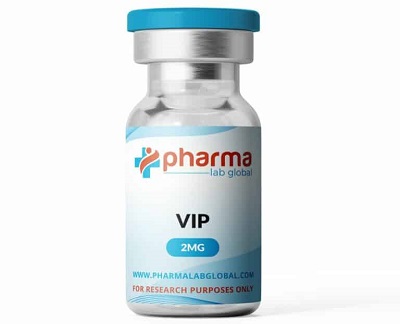VIP Peptide: Smooth Muscle Relaxation


Vasoactive Intestinal Peptide (VIP) is a powerful peptide that plays a pivotal role in various biological processes. It is involved in relaxing smooth muscles, promoting vasodilation, and maintaining healthy blood circulation.
The VIP gene is also crucial for regulating the immune system, alleviating inflammation, and improving both respiratory and digestive functions. This peptide is being investigated for its therapeutic potential in treating inflammatory conditions such as arthritis and Crohn’s disease, as well as respiratory disorders like pulmonary hypertension and asthma.
Furthermore, VIP is gaining attention in the field of neurology due to its neuroprotective effects, which may help manage neurodegenerative diseases. Its broad range of biological actions makes VIP a valuable subject in clinical and medical research.
Molecular Formula: C147H237N43043S
Amino Acid Sequence: HSDAVFTDNYXRLRKQM AVKKYLNSXLN
Clinical studies have highlighted several key benefits of VIP peptide:
Smooth Muscle Regulation: VIP aids in the proper function of the gastrointestinal and vascular systems by promoting smooth muscle relaxation.
Vasodilation: It helps in expanding blood vessels, promoting healthy blood circulation, and reducing high blood pressure.
Immune Modulation: VIP modulates immune responses, balancing pro-inflammatory and anti-inflammatory pathways to reduce inflammation.
Anti-inflammatory Effects: This peptide plays a vital role in managing chronic conditions such as arthritis and Crohn’s disease.
Respiratory Support: VIP improves lung function, offering potential relief for conditions like asthma and pulmonary hypertension.
Neuroprotection: VIP contributes to neuron health and may offer new avenues for treating neurodegenerative disorders such as Parkinson’s and Alzheimer’s disease.
VIP exerts its effects by binding to two specific receptors: VPAC1 and VPAC2, which are found in a variety of tissues. Upon binding, these receptors activate adenylate cyclase, which leads to an increase in cyclic AMP (cAMP) production. Elevated cAMP levels initiate signaling pathways that regulate several biological functions.
These pathways enable VIP to induce smooth muscle relaxation, supporting proper gastrointestinal motility and healthy vascular function. It also encourages vasodilation, which enhances blood flow and lowers blood pressure. Through these processes, VIP plays a key role in VIP Peptide: Smooth Muscle Relaxation, offering both immediate and long-term benefits to the body's vascular and digestive systems.
VIP is instrumental in immune regulation by reducing the production of pro-inflammatory cytokines and promoting anti-inflammatory responses. At the cellular level, VIP influences gene expression and processes that maintain tissue repair and homeostasis.
Moreover, VIP’s neuroprotective properties stem from its ability to protect neurons from oxidative stress and programmed cell death, making it a promising option for treating inflammatory diseases, respiratory conditions, and neurodegenerative disorders.
VIP Peptide holds significant promise in a range of therapeutic areas, supported by various clinical studies:
Regulation of Muscle Relaxation
VIP plays a crucial role in smooth muscle relaxation by binding to VPAC1 and VPAC2 receptors on target cells, which triggers adenylate cyclase activation. This leads to increased cAMP levels and initiates signaling pathways that relax muscle fibers.
In the gastrointestinal system, this relaxation is key to efficient digestion and food movement through the digestive tract. Within the vascular system, VIP promotes vasodilation, enhancing blood flow and supporting healthy blood pressure.
Blood Pressure Regulation
VIP peptide induces muscle relaxation, widening blood vessels, improving circulation, and reducing resistance. This helps ensure oxygen and nutrients are efficiently delivered to tissues, supporting cellular health. Furthermore, in vivo studies suggest that VIP helps lower blood pressure, reducing cardiovascular strain and minimizing associated risks. Its vasodilatory effects are essential for maintaining cardiovascular health and balancing the body's physiological processes.
Reducing Inflammation
VIP reduces inflammation by inhibiting the production of pro-inflammatory cytokines, such as TNF-alpha and IL-6, and simultaneously activating anti-inflammatory pathways. It interacts with immune cells, reducing inflammatory signaling molecules and modifying immune cell behavior, including T cells and macrophages. This dual action prevents chronic inflammation and tissue damage, making VIP a potential treatment for conditions like arthritis, colitis, and respiratory diseases.
Immune System Modulation
VIP peptide helps maintain a balance between pro-inflammatory and anti-inflammatory responses. It reduces pro-inflammatory cytokines such as TNF-alpha and enhances anti-inflammatory mediators. VIP also regulates immune cells like T cells and macrophages, promoting a more controlled immune response. This immune-modulatory effect could be instrumental in treating autoimmune and inflammatory diseases, helping restore immune balance and support overall immune health.
Enhancing Respiratory Function
VIP has been shown to improve respiratory function by relaxing smooth muscles in the airways and reducing inflammation in the lungs. This peptide promotes bronchodilation, expanding the airways and easing airflow. Additionally, it helps reduce the production of pro-inflammatory cytokines in the respiratory tract, potentially alleviating conditions like asthma and pulmonary hypertension.
Neurological Protection
In the realm of neurology, VIP plays a key role in protecting neurons by reducing oxidative stress and neuroinflammation, which are significant contributors to disorders like Alzheimer’s, Parkinson’s, and multiple sclerosis. It helps preserve brain function by regulating immune responses in the brain and shielding cells from damage. These effects may lead to improved cognitive function and reduced progression of neurodegenerative diseases.
Go to Homepage
With VIP peptide showing such vast potential, from regulating smooth muscle function to offering hope for neurodegenerative diseases, it is clear why this peptide has sparked growing interest in clinical and therapeutic applications. If you're involved in research, consider exploring VIP peptide’s various benefits and its potential to reshape treatments in several medical domains. And remember, as Mark Twain once said, “The secret of getting ahead is getting started!” So why not dive in and discover what VIP peptide could mean for your studies or practice?